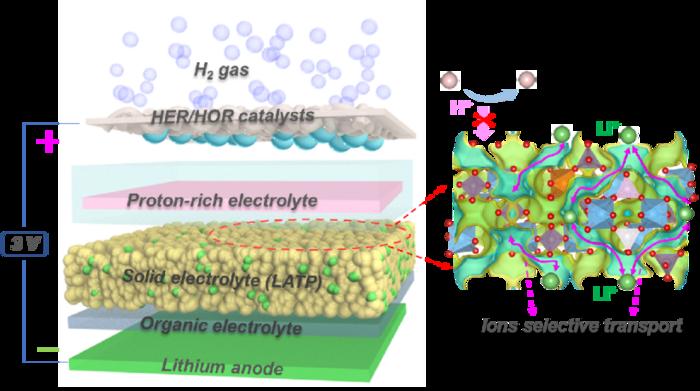
A groundbreaking advancement in battery technology has recently emerged from the University of Science and Technology of China (USTC), where a research team, spearheaded by Professor CHEN Wei, has unveiled a new class of rechargeable batteries that ingeniously utilizes hydrogen gas as the anode instead of the conventional lithium derivatives. This innovative system is polarizing the scientific community, offering potential to elevate energy storage solutions to unprecedented heights. The findings of this research, which have been duly published in the esteemed journal Angewandte Chemie International Edition, present a significant leap forward in energy storage and battery efficiency.
Historically, hydrogen (H2) has garnered attention as a viable renewable energy carrier, lauded for its remarkable electrochemical properties and its potential as an alternative to fossil fuels. However, existing hydrogen-based batteries predominantly employ hydrogen as a cathode, resulting in a restricted voltage range of 0.8 to 1.4 volts, thus limiting their energy storage capabilities. In the pursuit of amplifying battery performance, the USTC research team explored a revolutionary methodology, proposing the incorporation of hydrogen as an anode material, which catalyzes remarkable improvements in both energy density and operational voltage.
The researchers engineered a prototype battery system designated as the Li-H battery, blending lithium metal for the cathode with a platinum-coated gas diffusion layer that functions as the hydrogen cathode. Accompanied by a solid electrolyte (Li1.3Al0.3Ti1.7(PO4)3, or LATP), this arrangement facilitates efficient lithium-ion transport while mitigating unwelcome chemical reactions. The outcome of rigorous testing displayed a staggering theoretical energy density of 2825 watt-hours per kilogram, with a steady operational voltage hovering around three volts. Further assuring its efficacy, the battery exhibited an exceptional round-trip efficiency (RTE) measured at a staggering 99.7%, signifying minimal energy dissipation during charge and discharge intervals, coupled with remarkable long-term operational stability.
In a bid to enhance cost efficiency and manufacturing practicality, the research team advanced the concept further by developing an anode-free variant of the Li-H battery. This innovative design eliminates the necessity for pre-installed lithium metal by facilitating the deposition of lithium sourced from lithium salts (specifically LiH2PO4 and LiOH) during the charging cycle. The anode-free configuration secures the advantages of the standard design while ushering in additional benefits: enhancing lithium plating and stripping capabilities with a commendable Coulombic efficiency (CE) reaching 98.5%. Furthermore, it demonstrated operational reliability even at lower hydrogen concentrations, thereby substantially diminishing dependency on high-pressure hydrogen storage solutions.
Exploring computational simulations, notably through Density Functional Theory (DFT), the USTC team was able to delve into the intricate mechanisms dictating the movement dynamics of lithium and hydrogen ions through the electrolyte matrix. This computational modeling not only propels our understanding of the technology but also paves the way for enhanced designs and iterations of the battery systems in future research.
The implications of this stride in lithium-hydrogen battery technology resonate throughout numerous sectors, heralding new prospects for refined energy storage systems. Application ranges could encompass renewable energy grids, electric vehicles, and industries vying for sustainable energy alternatives. In comparison to conventional nickel-hydrogen batteries, the discerning attributes of the Li-H system—its superior energy density and heightened efficiency—position it as a compelling candidate for next-generation power storage methodologies.
As the world pivots towards sustainable energy resources, innovations such as the Li-H battery align with global efforts to mitigate climate change through cleaner energy technologies. The adaptability of the anode-free variation offers a pathway to lower costs and broader scalability, fostering further development of hydrogen-powered battery systems capable of revolutionizing electrical storage paradigms.
Beyond the confines of practical applications, the research embodies a commitment from scientists to surmount conventional limitations and rethink longstanding practices regarding battery storage and energy management. The potential utility of these advancements spans an expansive array of fields, from renewable generation models to the electrification of transportation sectors.
Realizing the pressing need to establish more efficient storage solutions aligns seamlessly with societal demands for cleaner, smarter energy systems. The USTC research group’s endeavors contribute richly to the dialogue surrounding sustainable technologies, energizing efforts to transition to renewable resources while minimizing reliance on fossil fuels. Furthermore, as advancements unfold, this research illuminates the path leading toward the widespread deployment of hydrogen technologies within batteries, heralding an era of more eco-conscious power supply methodologies.
Ultimately, the findings put forth by USTC’s research team have laid pivotal groundwork for future explorations into lithium-hydrogen technologies and their application potential. It will certainly ignite interest from industries and researchers alike who are united by a common goal: progress toward higher energy efficiency and the proliferation of environmentally-friendly energy solutions.
This scientific breakthrough not only highlights the importance of innovative research but also showcases the integral role that academic institutions will play in shaping our collective energy future. As technology continues to advance, one can only anticipate the ripple effects that such findings will have as they transition from the research laboratory into practical energy solutions on a global scale.
Subject of Research: Rechargeable Lithium-Hydrogen Gas Batteries
Article Title: Rechargeable Lithium-hydrogen Gas Batteries
News Publication Date: 22-Jan-2025
Web References: Angewandte Chemie International Edition
References: 10.1002/ange.202419663
Image Credits: Image by USTC
Keywords
Hydrogen energy, Lithium batteries, Energy storage, Renewable energy, Electric vehicles, Battery technology, Sustainable energy solutions.
Tags: advancements in battery voltage rangealternative energy storage systemsAngewandte Chemie International Edition publicationelectrochemical properties of hydrogenenergy storage solutions innovationhigh-performance rechargeable batterieshydrogen as anode in batterieslithium-hydrogen gas battery technologyProfessor CHEN Wei research findingsrechargeable lithium-hydrogen battery efficiencyrenewable energy carriersUSTC battery research advancements





